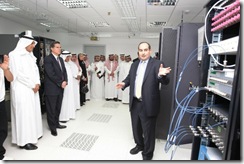Last September Intel inaugurated the region’s first Centre of Excellence for Wireless Applications (CEWA) in partnership with King Abdulaziz City for Science and Technology (KACST), in Riyadh, Saudi Arabia. The development forms part of Intel’s plans to expand its Digital Transformation Initiative for the Middle East and fits right into Saudi Arabia’s efforts to create a knowledge-based society
KACST is a sprawling establishment that signifies Saudi Arabia’s intent to diversify its economy away from carbon-based products and services and towards innovation and knowledge-based endeavours. Such objectives are in line with Intel’s own ambitions to foster the development of wireless applications and technology competence centres in various parts of the emerging world.
The key capabilities of the Centre of Excellence for Wireless Applications in Riyadh include offering expertise and consultative services to operators, governments, vendors and regulators to drive wireless applications and provide performance labs to evaluate and optimise wireless networks. In addition, CEWA is heavily geared toward research and development and offering managed services.
The CEWA initiative mirrors the three pillars of Intel’s Digital Transformation Initiative – that of fostering education, innovation and research, and will contribute to the company’s commitment to developing the skill sets of the region’s future generations for the new knowledge economy.
“Saudi is the largest market in the region, so it makes sense for us to establish our first such activity here,” said Tom Kilroy, senior VP and general manager of Intel’s Sales & Marketing Group. “The investment in broadband across the region is drastically improving the rate of collaboration as we can measure the number of people who are becoming connected and the impact this is having.”
Kilroy said Intel’s approach was part of a multi-year strategy aimed at producing regionally significant research products, and he forecast that in the coming 2-3 years more centres like the one in Riyadh would be established in the region.
“CEWA focuses more on the applications side of things, and it conducted a survey amongst all the operators in Saudi Arabia to determine what R&D priorities management had in place,” Kilroy stated. “This type of information is vital because it is our intention to help build the region locally. Ultimately we want to help CEWA in Riyadh and others like it become leading centres in the world.”
Intel first announced its Digital Transformation Initiative for the Middle East, at the end of 2005, describing it as a comprehensive, multi-year programme that would expand Intel’s economic, educational and technology-related support throughout the region.
Under the programme, Intel committed to increasing its investment in four key areas – local entrepreneurship, education, digital accessibility and specialised technical competencies – to help promote technology skills, knowledge transfer and jobs creation in the Middle East, Turkey and North Africa.
Intel notes that market liberalisation and reform are becoming increasingly common across the region, adding to its attractiveness as an investment destination. Technological innovation, a developed infrastructure, business-friendly government policies and a flexible and capable work force are the keys to further strengthening the Middle East’s investment appeal. At the same time that governments in the region are increasing their focus on developing science, engineering and technology skill sets to help them attract investments; Intel is providing support and resources to help enable technological and economic transformation.
Intel continues to work with several local governments, educational institutions, businesses, and non-profit organisations, programme developers, local businesses, and other groups and organisations to expand the use and understanding of technology.
“Performance and evaluation testing can be conducted at CEWA and not necessarily by operators,” said Hani Elgebaly, MD of Intel’s Middle East Wireless Communication Lab. “What we do here compliments that operators are doing. For instance we had a proof of concept project last Hajj where we helped make the authentication process of identifying pilgrims much quicker. It utilised 5,000 terminals but ultimately that number would reach four million in a commercial setting.”





0 comments ↓
There are no comments yet...Kick things off by filling out the form below.
Leave a Comment